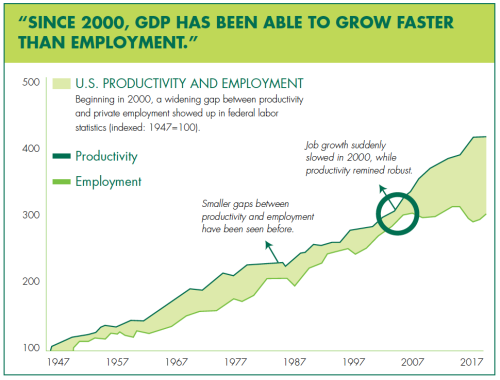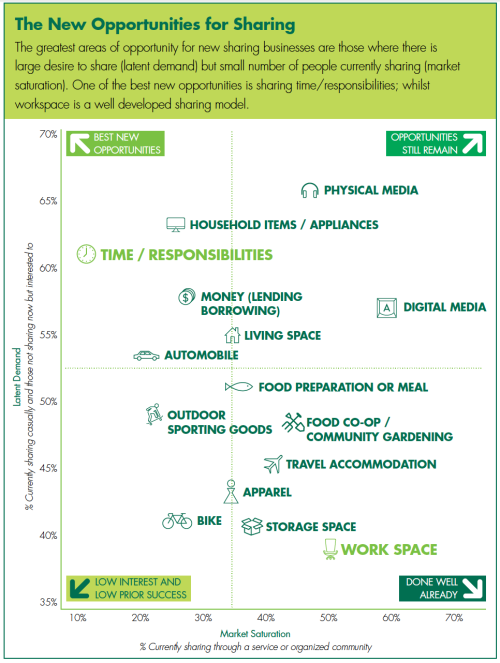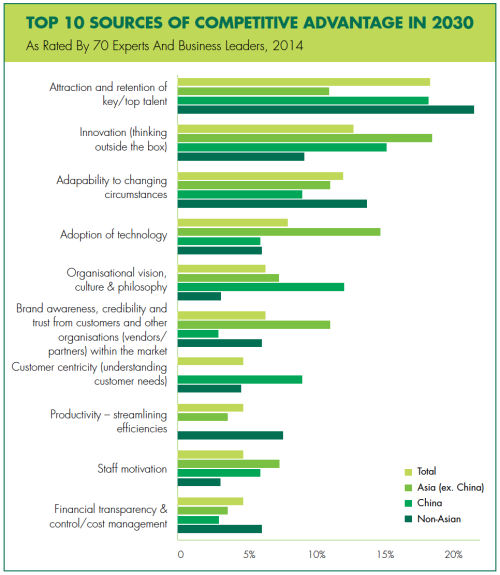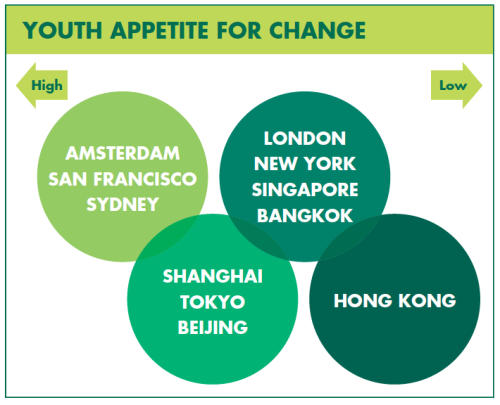
CBRE and Genesis recently released a report “Fast Forward 2030: The Future of Work and the Workplace,” which provides meaningful insight on the behaviors, ideas, and trends, that will shape work and the workplace in 2030. Their report analyzes responses from 220 experts, business leaders and young people from Asia Pacific, Europe and North America who shared their views on how the current workplace is evolving. That report’s focus was to look towards the future and identify trends that will change the way we work over the next 15 years globally, with a key focus on China and Asia. CBRE and Genesis aimed to capture the thoughts and aspirations of this next generation by holding focus groups, instead of traditional surveys or interviews, in 11 cities worldwide, where “more than 150 corporate youth between the ages of 23-29 gave their frank opinions about current work practices, and in particular, what is and isn’t working for them and more importantly how they would like this to change in the future.”
What will work look like in 2030? Through questions considering the nature of society and corporations, CBRE and Genesis ask respondents to identify what the big game changers will be for shaping the workplace between now and 2030. Major game changing trends and ideas included:
- The Holistic Worker
- Lean, Agile, and Authentic Corporations
- The Sharing Economy
“The Holistic Worker” was an idea echoed many times throughout respondents’ answers. This is a trend that we’re already seeing today, probably most prominently in the increasing attention to social responsibility among organizations. CBRE and Genesis report that “The Holistic Worker” will continue to be a significant influencer of change in the workplace. Their research shows an increasing belief that work should be “joyous and more full-filling,” and that within work there should be many opportunities to make meaningful contributions to the organization as well as society. Essentially, the data show that lines between work and life are blurring. People are more and more often expecting the freedom to choose how, where, and when they work, and these attitudinal shifts are slowly, but surely, creating a major change in workplaces and societies.
In CBRE and Genesis’s report, 78% of youth indicated that happiness was as important as financial success. 70% of Korean parents felt happiness for their children was more important than educational and financial success and in Japan, young employees in the focus group echoed the same sentiments, talking about a way of work totally different than the traditional ways of their parents. They spoke to workplace flexibility, going home to spend time with family, and working at many organizations over their career. Thai participants in youth focus groups said they would be willing to be paid 20% less if they could work in vibrant environments with the freedom and choice about how and where they get work done. Workplace flexibility and the desire for CSR are global trends, and certainly not limited to western culture. With the desire for work to having meaning and purpose, quick impact will be key. CBRE and Genesis anticipate that in 2030: “most work will be broken down into small, discreet, comprehensible components. Each component will have a clear purpose and teams delivering will have significant autonomy and control, responding to the many of the desires of the holistic worker.”
Another game changer for 2030, will be the need for organizations to be lean, agile and authentic – specifically, authentic. If organizations cannot be true to their values and contribute to society beyond the bottom line, their main source of talent, the holistic worker (and by virtue, also holistic consumers) will be extremely limited. CBRE and Genesis predict that technology and “artificial intelligence” will be huge game changers for organizations that can leverage them correctly. Organizations with 20-40 people can be just an impactful as large corporations, and by leveraging technology while being “unhindered by legacy processes and mindsets,” they will easily disrupt existing corporate models. The growth of technology, while being extremely beneficial for workplaces, is also a worrisome concept. CBRE and Genesis’s report points out it’s predicted that 50% of the occupations in corporations today will not exist in 2030, and points to evidence that in the U.S technology is already destroying more jobs than it is creating:
“The Sharing Economy” was another major underlying theme in CBRE and Genesis’s research. They define this as a socio-economic system built around the sharing of human and physical resources, whose emergence reflects changing attitudes in societies about ownership and collaborative consumption, fuelled by technology and apps that allow people to rapidly match supply and demand – person to person. Expert respondents in Beijing reported that the sharing economy would have significant impact to the future of work and the workplace in 2030, and used a research study by consultancy Latitude in the US71 as a framework for discussing how the sharing economy might impact real estate:  CBRE and Genesis also asked respondents about competitive advantage in 2030, and although answers covered a wide range, 10 top sources emerged, with attraction and retention of key/top talent as the number one source of competitive advantage followed by innovation.
CBRE and Genesis also asked respondents about competitive advantage in 2030, and although answers covered a wide range, 10 top sources emerged, with attraction and retention of key/top talent as the number one source of competitive advantage followed by innovation. 
When talking about innovation, respondents reported that for the future of the workplace “there will be constant innovation and support of entrepreneurial behaviors: micro-innovation within the organization”.
In several past posts I’ve discussed how the workplace is going increasingly global, yet to date most of the research in the area of work and the workplace remains from a western perspective. CBRE and Genesis’s report specifically widens the research to include not only western perspective but also those of developed and developing Asian nations, providing new and unique perspectives on a geographic level. Such perspectives can provide surprising results, such as the determination and excitement of young employees in Shanghai, Beijing and Tokyo to rethink the experience of work and push their superiors to change, vs. more conservative opinions than expected in New York and London. 
The bottom line? The youngest cohort of our employees – worldwide – are describing their preferences for work and the “office” of the not so very distant future as radically different than most work environments today. Those organizations desirous of developing their cultures to attract and retain today’s Millennials might take these findings into account. We Baby Boomers won’t be around forever. And that’s probably a good thing.
Be sure to check out CBRE and Genesis’ full report here.




